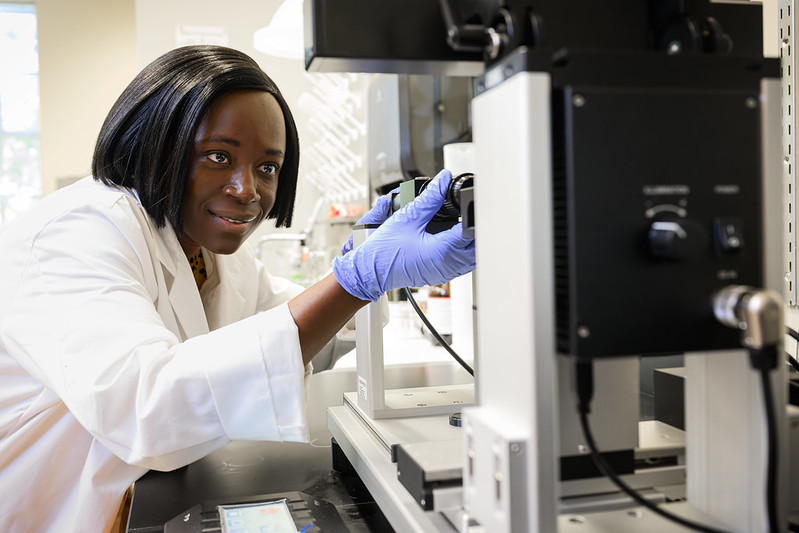content body

Soledad Peresin, right, is pictured with researchers in the Sustainable Bio-based Materials Laboratory of the College of Forestry, Wildlife and Environment.
An associate professor in Auburn University’s College of Forestry, Wildlife and Environment (CFWE), Soledad Peresin’s expertise lies in biopolymers and analytical chemistry; nanocomposites; nanotechnology and materials; and polymers and surface science.
But when you meet Peresin, these words bubble to the surface: an impassioned mentor devoted to creating equal opportunities for a diverse and inclusive population of students.
A first-generation college student from Argentina, Peresin said, “I am the only one in my family who ventured to graduate school, and to study abroad. It was a big learning curve, but I encourage everyone to try something new. You are capable of a lot more than you think.”
It’s this belief in others’ success that drives Peresin to be an agent of change — whether leading women in science, advancing DEI (Diversity, Equity and Inclusion) initiatives, fostering innovative solutions or mentoring a new generation of scientists.

Soledad Peresin, center, is pictured with researchers in the Sustainable Bio-based Materials Laboratory of the College of Forestry, Wildlife and Environment.
Next WISE leader
Peresin recently was chosen as the next Women in Science and Engineering (WISE) Institute chair; WISE resides within Auburn’s Office of Inclusion and Diversity. Peresin said the mission of WISE is “to enable and sustain equitable quality of life and experience for women in the university.”
WISE advocates for and enables opportunities for both STEM (Science, Technology, Engineering and Mathematics) and non-STEM female students, faculty and staff on campus. Mentoring is especially important.
“We want to create a network in which women can talk to other women and peers who may have gone through similar challenges in the university environment, so they can all thrive,” Peresin said.
For example, WISE presents opportunities to undergraduate students that include research and study abroad opportunities, faculty introductions and the Together Embracing Successful Scholars (TESS) Talk series. Peresin also is focused on “first identifying and then embracing participation of allies in this women’s group. This includes everyone who is not a female or identifying as female but cares about the equality and advancement of women.”
As a single mom with a 9-year-old child and an active academic career, Peresin is aware of the challenges of balancing her personal and professional lives. She wants WISE to help others.
“I want women to know they are not alone in this enterprise,” she said. “A lot of women go through challenges in professional careers. Opportunities are not always equal or even there. But I am a very passionate advocate of equity and inclusion.”

Soledad Peresin, center, and a team of researchers are at work in the Sustainable Bio-based Materials Laboratory of the College of Forestry, Wildlife and Environment.
Diverse experiences solve complex challenges
Peresin serves on the Advisory Board of the Young Professionals in Training (YPIT) program, offering mentoring and tutoring for fifth-12th grade underrepresented students, and works closely with the Minorities in Agriculture, Natural Resources and Related Sciences (MANRRS) Auburn chapter, housed in CFWE.
Serving as chair of the CFWE DEI Committee and CFWE DEI representative at the Faculty Senate level, Peresin believes in the power of bringing diverse minds and experiences to the table to tackle complex challenges.
“The good news is we face a generation that has a clear understanding that, without a diverse pool of people, you cannot make advances, especially in the field of science,” Peresin said. “The only truly translational research, the base of making significant advances, relies on diversity. Everyone brings something to the table.”
Passion for the Sustainable Bio-based Materials Laboratory
“The goal of the Sustainable Bio-based Materials Laboratory is to utilize biomass, like wood, soybean hulls or byproducts from any other agroindustrial activity, and add value by creating new products which are sustainable. We want to create sustainable solutions for issues of environmental concern,” Peresin said.
And Peresin and her cohort of researchers are making that happen.

A researcher is pictured in the Sustainable Bio-based Materials Laboratory of the College of Forestry, Wildlife and Environment.
In the spring, 17 people worked in the lab. Ten are working there so far this fall, including a variety of researchers: graduate students, post-docs, visiting scholars and professors and even undergraduate students. Undergraduate students start by shadowing an existing team member on an existing project, and then Peresin encourages them to formulate their own research question and project.
Examples of the work in the lab include:
- Using biomass materials to replace adhesives for wood products with lower formaldehyde emissions
- Utilizing by-products from forestry and agriculture industries for added value product development
- Developing bio-based diagnostics platform for emerging contaminants and allergens
- Cultivating solutions to alleviate mosquito-borne diseases such as malaria with single-use detection devices and bio-based insecticidal nets
- Improving the innovation portfolio and profitability of the forest products industry
Combining research and equity, Carly Cummings, one of Peresin’s doctoral students, developed environmental science education models for water remediation made from biomass, in hopes to extend STEM literacy in Alabama. Auburn High School implemented her program, and other schools across the state are modeling it. Peresin anticipates the program will be adopted by Alabama Science In Motion in the near future.
Forever a mentor
It’s evident in her many roles Peresin is a consummate mentor.
“I had wonderful mentors myself. In fact, I wouldn’t be here if I did not have those mentors,” said Peresin. “I do wish in some instances in my career that I would have been bolder and asked for more help. I do not think college students are aware of how many opportunities they have. I am working on breaching that gap.”
Peresin sees the mentor-mentee relationship as an opportunity for both to become more well-rounded professionals, and she believes it should be fun.




